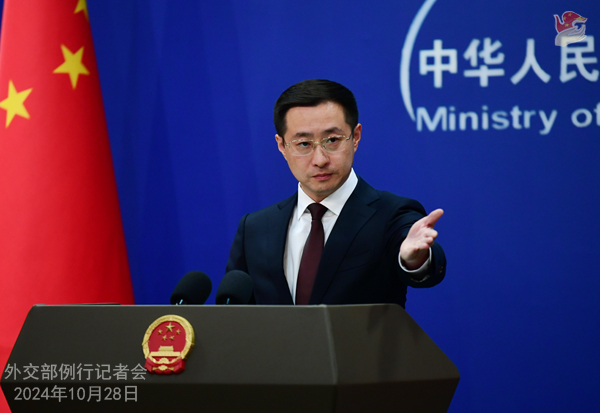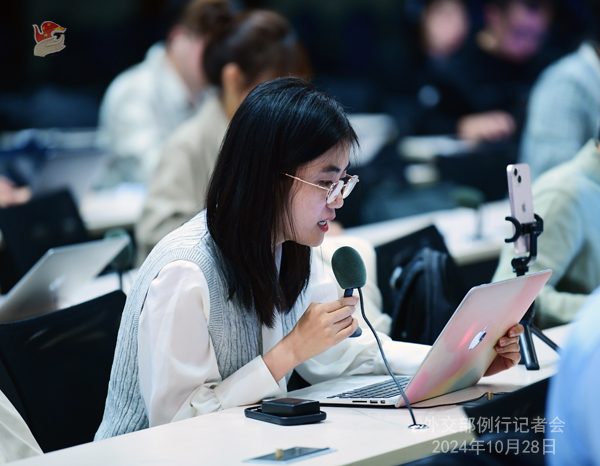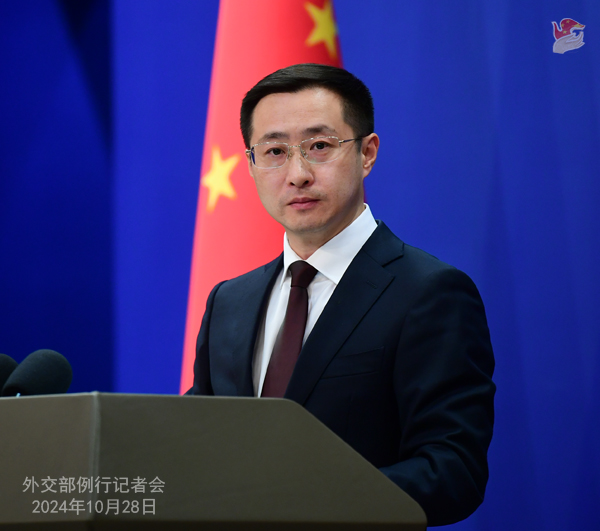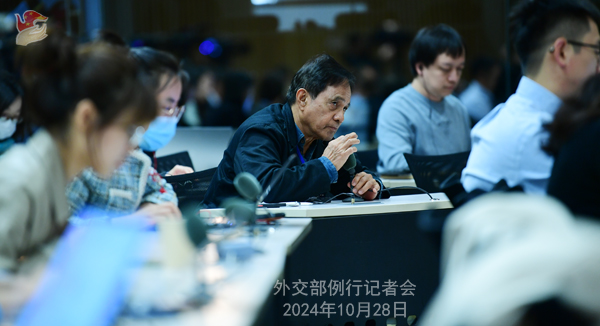
At the invitation of Premier Li Qiang of the State Council, Robert Fico, Prime Minister of the Slovak Republic, will pay an official visit to China from October 31 to November 5.
People’s Daily: To follow up on Prime Minister of Slovakia Robert Fico’s official visit to China, could you share with us the program and China’s expectation of the visit? How does China view its current relations with Slovakia?
Lin Jian: China welcomes Prime Minister Robert Fico’s official visit to China. During the visit, President Xi Jinping will meet with him, and Premier Li Qiang and Chairman Zhao Leji will have talks and meet with him respectively. The two sides will have in-depth exchanges of views on bilateral relations and issues of mutual interest.
Slovakia was among the first countries to recognize New China, and the two countries enjoy profound traditional friendship. This year marks the 75th anniversary of diplomatic relations between China and Slovakia. Bilateral relations have shown a robust momentum with fruitful exchanges and cooperation in various fields. Through Prime Minister Fico’s visit, China stands ready to work with Slovakia to deepen the traditional friendship and political mutual trust, expand exchanges and cooperation in various fields, promote high-quality Belt and Road cooperation and cooperation between China and Central and Eastern European countries, and elevate the bilateral relations to a higher level.
Reuters: Do you have any comment on Japan’s election and the possibility of a change in the makeup of its government? Do you think that could lead to any changes in its security policy such as plans to build up its military which Beijing has criticized in the past?
Lin Jian: We noted the election results. This is Japan’s internal affair, and China doesn’t have a comment on that. The sustained, sound and steady development of China-Japan relations serves the fundamental interests of the two peoples. We hope that Japan will work with China in the same direction, act on the principles and consensus in the four political documents between China and Japan, comprehensively advance the strategic relationship of mutual benefit, and strive to build a constructive and stable China-Japan relationship fit for the new era.
CCTV: Uzbekistan held elections of the Legislative Chamber of the Oliy Majlis on October 27. Does China have any comment on this?
Lin Jian: China congratulates Uzbekistan on the smooth elections of the Legislative Chamber of the Oliy Majlis. At the invitation of Uzbekistan’s Central Election Commission, China sent a group to Uzbekistan to observe the elections. China believes that the elections are democratic, open and transparent, and demonstrate the political openness and inclusiveness of the country. China highly commends that and sincerely wishes the people of Uzbekistan greater achievements in national development.
As a friendly neighbor and all-weather comprehensive strategic partner for a new era, China attaches great importance to its relations with Uzbekistan, and stands ready to work with Uzbekistan under the guidance of the important common understandings between the two presidents, step up mutual support and strategic coordination, deepen mutually-beneficial cooperation on all fronts, and achieve high-quality development of the bilateral relations.

TASS: First, according to media reports citing the US Space Forces, the US military is planning to introduce a new type of satellite jammers next year, which are mainly designed to counter Russia and China. How does the foreign ministry comment on the US national space defense strategy? If such a policy poses a real threat to China’s space exploration, what position would China take? Second, on October 26, Israeli forces struck military facilities in Iran, which has escalated tensions and endangered civilians. Israel continues to expand its attacks, causing massive casualties. What is China’s comment on the situation in the Middle East in recent days?
Lin Jian: On the first question, China stays committed to the peaceful use of outer space, and opposes arms race in outer space or weaponizing outer space. China has no intention to engage in a race with other countries in space and doesn’t seek to gain an edge in space.
The US has openly characterized outer space as a “battlefield,” kept building up military in outer space, and patched up space military alliances, which attempts to turn outer space into a battlefield, and severely threatens the common security and development rights and interests of other countries in outer space. China once again urges the US to stop spreading irresponsible remarks, stop expanding military build-up in outer space, and make due contribution to upholding the lasting peace and security in outer space.
On the second question, China opposes violating the sovereignty and undermining the security of other countries and opposes the abuse of force. The tensions in the Middle East are running high. Relevant parties need to refrain from further increasing the overall security risks in the region. The recent incidents once again highlight the urgency to end the fighting. The international community, especially major countries with influence, should take concrete actions to play a constructive role and create necessary conditions for the deescalation of regional tensions.
China News Service: The 11th China-Central Asia Cooperation Forum was held from October 25 to 28 in Yinchuan, Ningxia. Shen Yueyue, Vice Chairperson of the National Committee of the Chinese People’s Political Consultative Conference and President of the Good-Neighborliness, Friendship and Cooperation Commission of the Shanghai Cooperation Organization (SCO) attended the opening ceremony and delivered a keynote address. Could you tell us more about this forum and share with us the main outcomes of this event?
Lin Jian: From October 25 to 28, the 11th China-Central Asia Cooperation Forum was held in Yinchuan, Ningxia. This forum was co-hosted by the Good-Neighborliness, Friendship and Cooperation Commission (GNFCC) of the Shanghai Cooperation Organization (SCO) and the People’s Government of Ningxia Hui Autonomous Region under the theme of “Promoting Green Development and Building a Common Home.” Shen Yueyue, Vice Chairperson of the National Committee of the Chinese People’s Political Consultative Conference and President of the GNFCC of the SCO attended the opening ceremony and delivered a keynote speech. Over 300 people attended the forum, including Kyrgyz Deputy Prime Minister Edil Baisalov, Tajik Deputy Prime Minister Sulaymon Ziyozoda, the First Deputy Speaker of the Legislative Chamber of the Parliament of Uzbekistan Akmal Saidov, SCO Secretary-General Zhang Ming, Executive Director of the Secretariat of the China-Central Asia Cooperation Mechanism Wu Yingqin and representatives from the government, localities, business community, friendly groups and media of China and the five Central Asian countries and diplomatic envoys in China.
China put forward a five-point proposal on moving forward the mutually beneficial cooperation of the two sides. First, continuing to give each other stronger support and foster the community with a shared future for both sides. Second, promoting green development and cooperation under the Belt and Road Initiative and bolstering the material foundation for the relations between China and the five Central Asian countries. Third, improving China-Central Asia mechanism building and creating a flagship platform for cooperation for the six countries. Fourth, boosting sub-national cooperation and continuing to add new dimensions to China-Central Asia cooperation. Fifth, practicing true multilateralism and creating sound external environment for common development.
Participants expressed congratulations on the 75th anniversary of the founding of the People’s Republic of China, spoke highly of the great achievements China has made in its development under the leadership of President Xi Jinping and believed that the third plenary session of the 20th Central Committee of the Communist Party of China provides a strong driving force for advancing Chinese modernization. They also expressed readiness to work with the Chinese side to follow through on the common understandings of our heads of state, continuously deepen Belt and Road cooperation, expand cooperation in such areas as economy and trade, investment, connectivity, energy and green economy and advance the building of a community with a shared future for China and each of the Central Asian countries and the China-Central Asia community with a shared future.
The event included four parallel sub-forums on industrial green development, modern agriculture and technological innovation, sister city cooperation and cultural exchanges, and regional cooperation. A slew of activities were held during the forum, including a photo exhibition of achievements in China-Central Asia cooperation and a tree planting activity in commemoration of friendship between the youth of China and Central Asian countries. The forum also witnessed the issuance of the Yinchuan Initiative and the signing of several cooperation documents.
Antara: Indonesian Foreign Minister Sugiono last week expressed Indonesia’s commitment to joining BRICS, viewing it as a strategic platform to advocate for the interests of developing nations and the Global South. What is China’s response for this intention?
Lin Jian: As an important platform for emerging markets and developing countries to enhance solidarity and cooperation and uphold common interests, the BRICS cooperation mechanism has become a positive and stable force for good in international affairs. Indonesia is an important major developing country and emerging economy and has actively involved itself in “BRICS Plus” cooperation in recent years. BRICS is an open and inclusive mechanism and we welcome more like-minded partners, including Indonesia, to join the BRICS family.

Global Times: The Wall Street Journal recently reported that Western countries believe that China is conducting espionage activities on an “unprecedented scale” to undermine rival states and bolster the country’s economy and that Western spy agencies are unable to contain Beijing’s activity. Does China have a response to that?
Lin Jian: I don’t know what factual basis this report has. For some time, a very few Western media outlets have been peddling disinformation on so-called espionage activities by China, but they presented no facts or evidence apart from some assumptions and speculations. Yet, I noted that the CIA recently posted on social media instructions in Chinese on how to contact it online, in an attempt to lure Chinese personnel to be their informant. This seriously infringes on China’s national interest. China strongly protests this. We will resolutely crack down on infiltration and sabotage activities by anti-China forces outside China and defend national sovereignty, security and development interest.
The CIA has long been using all kinds of despicable methods to steal other countries’ secrets, interfere in their internal affairs and commit subversion. The US has never stopped its espionage activities against China. It has also long been conducting massive surveillance and secret theft against its allies. The US on the one hand blatantly carries out spying activities worldwide, yet on the other makes unwarranted accusation of spying threat against other countries. This is a clear misrepresentation of the facts.
The US needs to immediately correct its wrongdoing, stop its tricks of framing others, and stop creating more chaos and turbulence in the world.
Shenzhen TV: From October 23 to 25, China and ASEAN’s rotating chair Laos jointly held in Shenzhen the Regional Workshop on Implementing the Biological Weapons Convention and Promoting Biosafety and Biosecurity in Southeast Asia. Can you share more details?
Lin Jian: This is the first workshop jointly held by China and ASEAN countries on implementing the Biological Weapons Convention and promoting biosafety and biosecurity. The workshop delivered positive outcomes. China and ASEAN’s rotating chair Laos jointly issued the Co-chairs Summary, which includes consensus in four aspects:
First, advance the modernization of biosafety and biosecurity governance and related capacity, by way of promoting exchanges and mutual learning. Second, build political consensus for a collective effort in countering biosafety and biosecurity risks, so as to benefit humanity through biotechnologies. Third, improve global biosafety and biosecurity governance, reaffirm the commitment to the Biological Weapons Convention and support relevant international and regional organizations in providing more public goods. Fourth, explore follow-up actions, and strengthen regional cooperation and coordination in the field of biosafety and biosecurity through various ways, including holding workshop as such on a regular term.
China attaches great importance to global governance on biosafety and biosecurity. We have included capacity building in biosafety and biosecurity governance in the Global Security Initiative Concept Paper, listing it as a priority in international cooperation. Closer exchanges and cooperation between China and Southeast Asian countries on biosafety and biosecurity will provide new impetus for the China-ASEAN comprehensive strategic partnership and contribute to global governance on biosafety and biosecurity.
NBC: This may be related to the Global Times question, but specifically, there are reports that the US government is investigating what they claim to be actors related to the People’s Republic of China, which hack into the communications network of the US, targeting specifically the telephones of relevant US politicians. Can you comment on that?
Lin Jian: I am not familiar with what you mentioned, but I noted relevant report, which in particular mentioned a so-called hacker group “Salt Typhoon.” Recently the US seems to be enthusiastic about creating various types of “typhoons.” Let me point out that on the “Volt Typhoon” incident previously hyped up by the US, China’s cybersecurity institutions issued several reports to reveal the fact, which provided solid evidence proving that “Volt Typhoon” is in fact an international ransomware group, and that the US created false narratives about the origin-tracing of cyberattacks to frame up China. The reports made it clear who is the biggest threat to global cybersecurity.
China urges the US to stop various types of irresponsible moves to blame the victim, stop cyberattacks globally, and stop using cybersecurity issues to vilify China.
